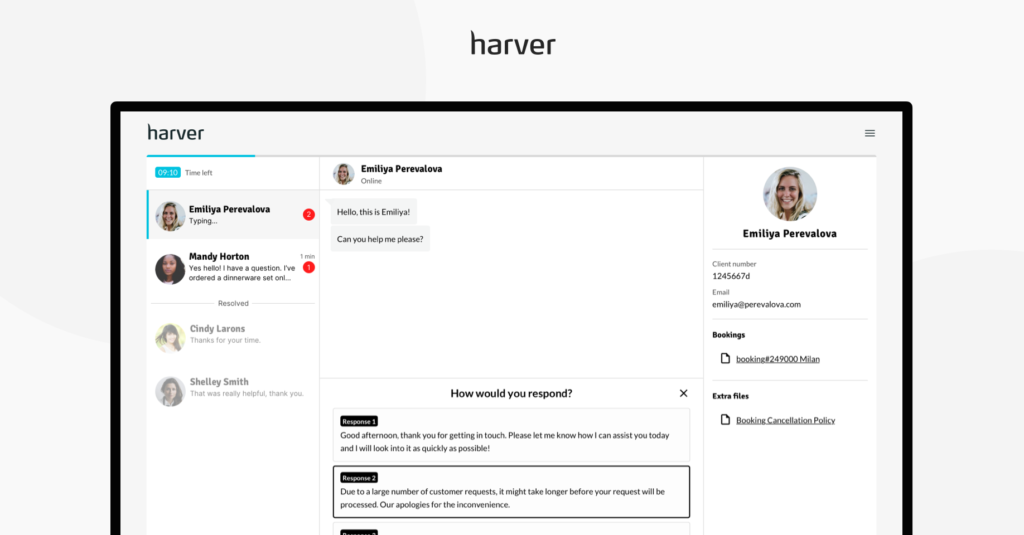Live chat support is the fastest growing business segment for contact centers, growing 150% YOY. Customers prefer live chat over any other means of communication as it’s quick, easy, and mimics how we communicate in our daily lives.
But because live chat is such a new market, call center and BPO hiring managers tend to rely on outdated assessment methods, such as typing tests, when evaluating candidates. Although such tests can tell a recruiter how fast a candidate can type a message, when used in isolation, these tests fail to assess the full range of skills that are necessary in a modern call center.
Even live chat agents who are only responsible for written chat support require more skills than just typing speed or accuracy. So what is the alternative?
In this article we’ll explore the difference between chat simulation vs typing tests, and how you can hire better contact center agents by replacing typing tests with more comprehensive pre-employment assessments, such as live chat support simulation assessments.
Let’s dive in.
What’s in?
Like what you see?
Don’t miss out. Subscribe to our quarterly digest to get the latest TA and TM resources delivered right to your inbox.
Typing speed tests overview
Typing tests measure a candidate’s average typing speed and accuracy. They are widely used to evaluate candidates for customer support or customer service roles.
In a timed typing test, candidates are scored on the number of words they type in a set time, and how many of those words were accurately typed, including capitalization and punctuation.
But the problem isn’t with the typing test per se, the issue is that they simply aren’t a good indicator of job performance.
Typing tests don’t provide a holistic view of candidates, just their ability to type efficiently and coherently. And live chat agents in modern contact centers and BPOs are required to do more than merely type to deliver outstanding customer support.
To properly assess candidates, hiring managers need screening methods built on a two-way matching framework. Recruiters need to be able to sell the role and the company while simultaneously evaluating applicants.
Typing test alternative: Chat support simulation
In a modern call center or BPO, chat support agents must be able to talk to multiple customers, multi-task while problem-solving (i.e. checking multiple systems at the same time) and enter abbreviated information that is still understandable to anyone else reading the customer records.
Of course typing accuracy is important, but it’s a different kind of accuracy that’s needed. More than what is measured with a traditional typing test.
Accurate typing in a modern call center or contact center requires knowledge of the computer system, as well as knowing the best way to capture the customer’s or client’s message to the organization. For example, are they communicating a product or service order? A complaint? An explanation of special requirements? A problem needing resolution or a simple question.
And to do that, recruiters need a way to assess candidates across a range of skills, characteristics and traits. Which is what a chat support simulation delivers.

A chat support simulation determines if candidates have traits and skills predictive of success for the role. The concurrent nature of the chat support function puts an emphasis on skills such as multitasking, language and grammar proficiency, as well as typing skills. And traits such as empathy, patience, adaptability and customer focus.
And these traits and skills are interdependent, requiring recruiters to assess them simultaneously, in order to make better hiring decisions.
Harver’s live chat module for example, grades candidates on their performance based on various live chat support KPIs, including average request handle time, service level, adaptability, customer focus, multitasking etc.
This module not only assesses applicants through a variety of real life, real time support requests, but it presents the assessment as a realistic job preview (RJP)
An RJP sells the role to the applicants while assessing them. It provides candidates an insight into what the role is like on a daily basis. If applicants don’t like what they see, they can remove themselves from the application process, decreasing early attrition rates, and reducing the risk of a bad hire.
Challenges when hiring live chat agents
And while these reasons make implementing the chat support function a no-brainer. However, from a recruitment standpoint, it has numerous challenges.
The chat support function for contact centers and BPOs is an emerging market, meaning there are more open roles than there are candidates with experience.
The skills and traits that make a great live chat agent aren’t the same ones that make a great phone support agent. The characteristics that were indicative of top performers in the past are not transferable in today’s contact centers and BPOs.
The biggest recruitment challenge call centers and BPOs face is high attrition rates of 30-45%, 3X the standard rate of other industries. In a tight labor market, recruiting to fill any positions is tough. Hiring live chat agents in a cost effective, candidate friendly way can seem nigh on impossible.
So how does a chat support simulation help contact centers and BPOs with their volume hiring efforts?
- White paper
Before you continue!
Don’t forget to grab your free copy of our white paper on contact center volume hiring in 2021. Learn about:
-
The challenges currently shaping the contact e
center recruitment space - How employers can navigate the new remote-first reality, and the role of technology in a future-proof recruitment process
- The four building blocks of a fully digital recruitment process

Chat support simulation: Advantages for CC/BPOs
The advantages of using live chat support for contact centers and BPOs are numerous:
- It’s a low barrier option for customers wanting a quick chat
- It’s already customers’ preferred method of communication
- It increases web conversions
- It allows you to harvest customer data
- It offers a quick and discrete means of resolving customer complaints
- It’s a low cost option in comparison to phone calls
- It delivers rapid resolutions
- It’s very easy for managers to monitor
- It supports your digital transformation
- It delivers a boat load of insightful customer data
1. A realistic job preview
A realistic job preview (RJP) such as a chat support simulation is essentially a virtual job tryout.
A live chat support simulation enables recruiters to measure the requisite skills, characteristics and traits that are predictive of future job performance. It also allows TA teams to showcase the role to all candidates.
A RJP such as chat support simulation provides each applicant a peek behind the curtain. They can see (and try) for themselves, exactly what the day to day work as a chat support agent would involve.
By giving applicants a realistic preview of what the job is like, it helps candidates determine if they are a good fit for the role or not. And applicants who don’t like what they see can deselect themselves from the hiring process. A lost candidate is, after all, a lot cheaper than early attrition due to misaligned expectations.
Our chat support simulation is a realistic fully automated assessment that measures a candidate’s ability to effectively multitask. Can they have multiple chats in real time at once? Can they handle incoming support requests at the same time?
It can be used as a standalone assessment or it can be used in conjunction with other pre-employment assessments, to get an all-round view of each candidate.
2. Scalable
When carrying out high volume hiring, everything is bigger: the time to hire, the cost to hire, the attrition rates.
A chat support simulation is a scalable option that enables recruiters to meet staffing demand without the need to hire extra recruiters, without extending the time to hire, and without escalating recruitment costs.
3. Delivers a fun candidate experience
The main reason for high attrition in contact centers and BPO industries is misaligned expectations. These sorts of roles are demanding, and the type of people who typically apply for them don’t always appreciate just what they’re signing up for.
A holistic solution like a chat support simulation doesn’t just give candidates an insight into the demands of the role, but it does so in a fun and engaging way that candidates may not ordinarily experience when applying for entry level roles.
A live chat simulation puts candidates in a fun environment that closely mimics the real life role. And when paired with a learning agility test or a personality test, not only does the recruiting team gain an additional insight, so too do the candidates learn something about themselves that they might not be aware of.
4. Beneficial to recruiters too
While candidates enjoy a fun assessment experience, recruiters benefit too by getting an accurate score for each candidate based on the organization’s specific recruiting benchmarks.
Harver, for example, as well as delivering regular skills based matching, allocates each candidate a matching score enabling recruiters to make a data driven hiring decision or a job placement.
Hire better live chat agents, at scale.
Dive into the rise of live chat, the skills of top-performing agents, and how to best assess them to reduce attrition and guarantee top-notch customer service.

5. A data driven hiring decisions
A great assessment is only as good as the data it delivers. Meaning, if your assessment results aren’t easily interpreted and displayed in a user friendly manner, it won’t help your recruiters process thousands or even tens of thousands candidates quickly and accurately.
Harver’s dashboards allow recruiters to understand each candidate’s results at a glance, including their matching score, or role fit.
By using a simulation that mimics real life, candidates get to experience the role for themselves while demonstrating their skill set. At the same time, recruiters receive a dearth of data enabling them to make fast, accurate, bias-free, data driven hiring decisions.
6. Suitable for contact centers and BPOs
Chat support simulations can be used to assess a variety of competencies in all manner of customer service support roles. However, they deliver the most benefit where service support is provided primarily through chat, text, or a web-based platform.
Harver’s chat support simulation, for example, is designed to be used in high volume support roles. The sort of roles that routinely have high attrition rates. The simulation helps lower attrition rates by managing candidate expectations about what the role entails on a daily basis, giving candidates an opt-out option if they don’t like what they see.
Next steps
When used in isolation, typing tests don’t provide contact center recruiters much data to go on.
Assessing an applicant’s typing accuracy and speed only gives a realistic representation of their keyboarding activities. But modern contact centers and BPOs require chat agents to do more than simply type.
And with expectations for customer support evolving, the way you hire your contact center and BPO agents has to evolve too. Investing in a future proof, accurate recruitment solution such as a live chat support simulation, not only gives you a competitive advantage, but it helps ensure your business is able to win new opportunities while delivering for your clients in the live chat space too.
In the last year alone, we’ve helped global contact centers and BPOs such as Alorica, NexRep, and Wayfair navigate the changing market and transform their hiring process.
If you’d like to learn more about how Harver’s chat support simulation can help you with your high volume recruitment, you can try it below or book a demo.
Experience our best-in-class Live Chat Assessment first-hand!
Perfect for remote hiring, our live chat assessment makes it easier than ever to hire live chat agents. Candidates experience the job, while you get actionable data to drive hiring decisions.



